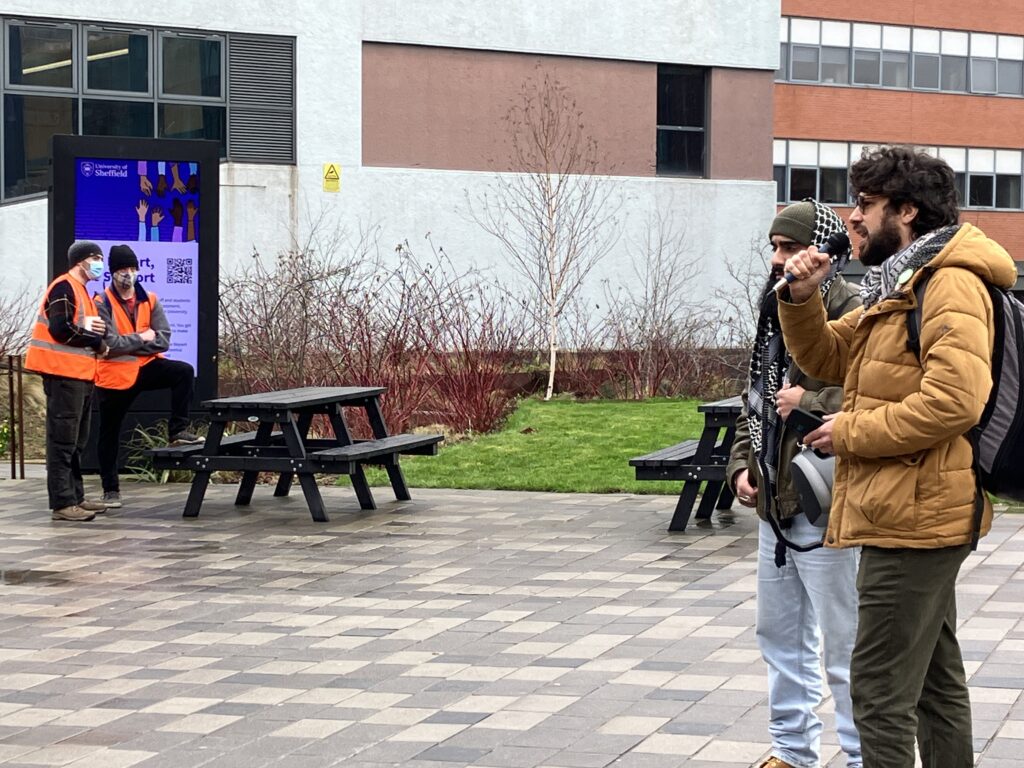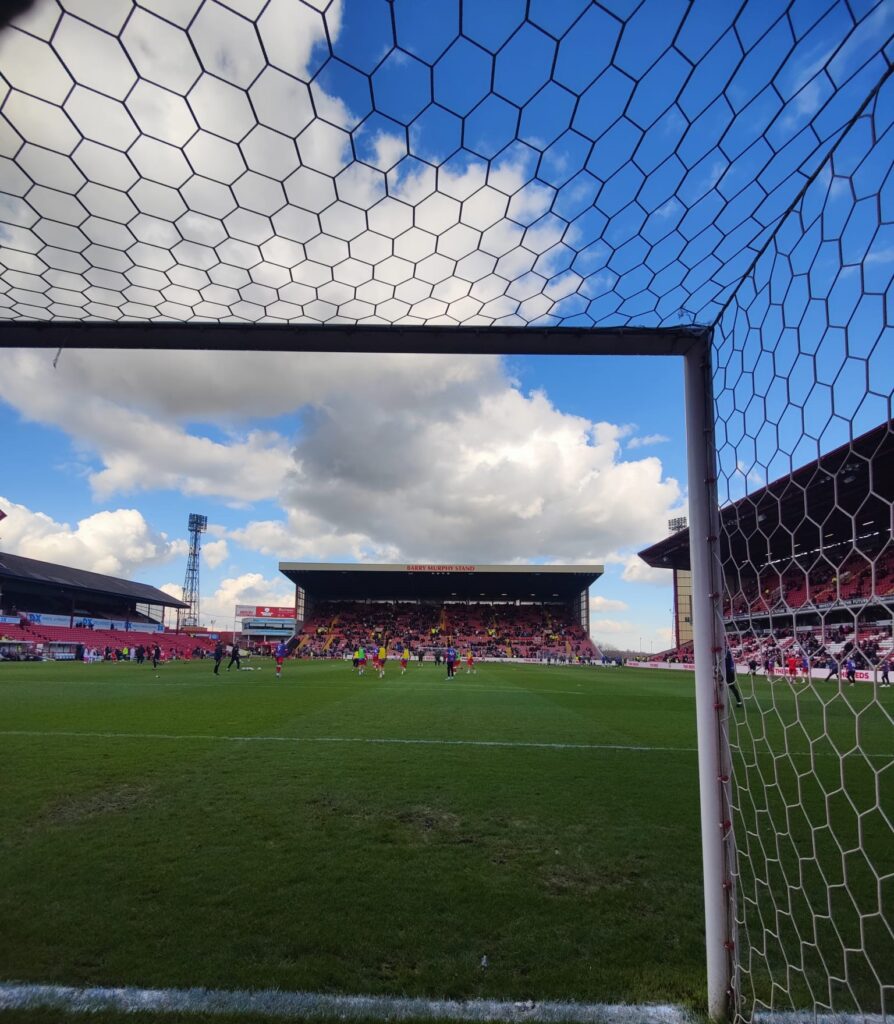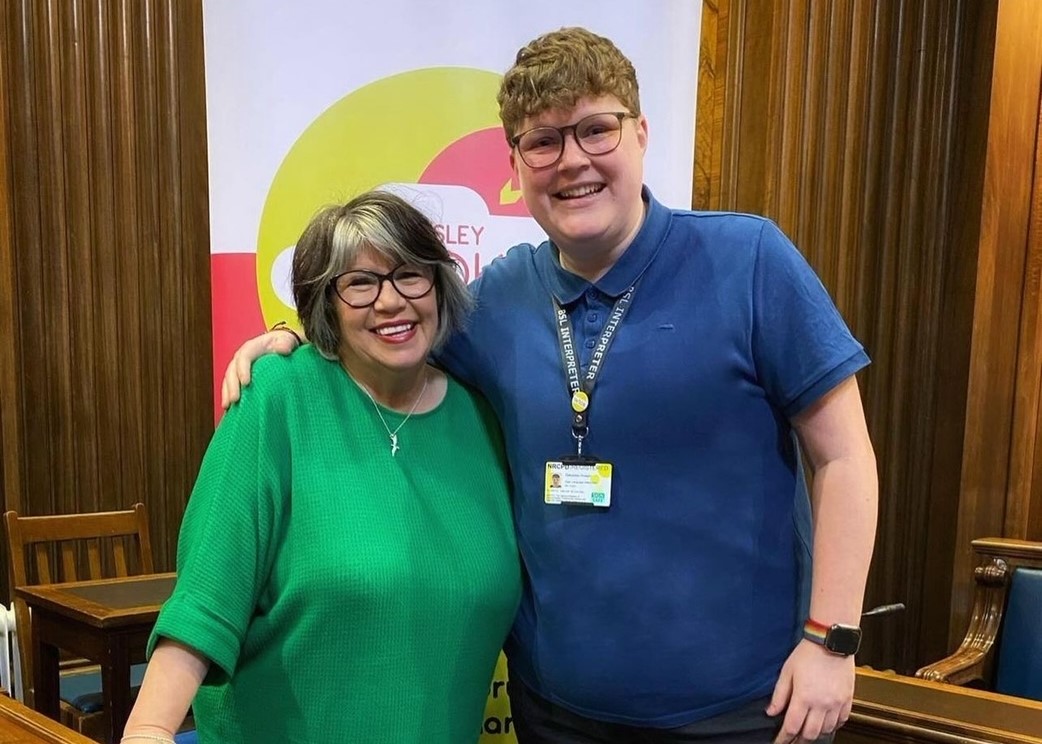
Sheffield R&B singer Lavelle Daley talks about the success of new single that topped the iTunes charts
A Sheffield R&B singer-songwriter and BGT star tops the iTunes charts for the second time with her song ‘Honest’.
Lavelle Daley’s second single soared to number one in the UK R&B charts upon its release on 26 January and was song of the week on BBC Radio 1xtra two weeks ago. Her previous single, ‘Baby Boy’, was in the top 20 of the iTunes UK R&B charts upon its release in August 2023.
Lavelle said: “I did not expect it. Whenever you release music you might hear it will be received well but at the end of the day it is never guaranteed.”
The music video for ‘Honest’ was filmed in Sheffield City Hall and features Lavelle’s team and friends. She said: “I feel really lucky I can look around my team and see my friends, people who have been supporting me throughout my journey.”
The singer opened up about what inspires her to keep moving forward: “My son is a massive battery in my bag. He is non-verbal and autistic and I understand his reality will be different to that of neurotypical children. I have to make sure that he is sorted above everything else.”
Lavelle, who just got booked for Tramlines, is currently working on a new project that she hopes to release next year.
The singer also performed at the MOBO Awards afterparty that took place in Sheffield earlier this month: “Everything since the MOBOs week has been high, high high, now we all got the MOBO blues. I wish I could go back and do it all over again.”
When asked about what she hopes to achieve in the future, Lavelle said: “I want a few number ones, a few top 10s, I want to build an autism awareness foundation and maybe write a song for Drake. Being a good mum is number one on the list.”
Sheffield anti-abortion group says they “won’t go away”
The anti-abortion group claims they are holding peaceful vigils for 40 days to raise awareness, rather than judge women.
40 Days For Life is an international Christian organisation that claims it is ‘helping to end the injustice of abortion’. Its first campaign took place in 2007, and has reached over 1000 cities in 63 countries.
Mrs Woods, who assists in running the organisations helplines, said: “We believe life is a gift. Abortion hurts women – they think it’s a right to choose, but it does hurt women.”
Sheffield pub set to reopen as a bar and grill
Sheffield councillors are currently considering an application to convert The Barrel Inn into a new food establishment.
The pub, which was famously popular with Sheffield United fans, is planned to be converted into D'Ahni's Bar and Grill.
The London Road establishment will apply for licenses to serve both food and alcohol.
It is currently proposed that this establishment will be open until 4am on Fridays and Saturdays.

Morning briefing: Stories to come throughout the day
Here are three stories to look out for on the Sheffield Wire today.
South Yorkshire has seen a 650% spike in antisemitism since Hamas's 7 October attack on Israel according to data obtained from the Community Security Trust.
Sheffielders are reacting to the council's plan to increase rent by 7.7% from April amid the ongoing cost of living crisis.
An anti-abortion group holding a 40-day vigil outside the city's Royal Hallamshire Hospital has told the Sheffield Wire that it "won't go away".
More to come throughout the day.
Plans to reallocate HS2 funding is said to be “transformational”
Following the decision to scrap the northern leg of HS2, Rishi Sunak has announced that the £4.7 billion that has been earmarked for the north will now put into local transport schemes.
In an interview with BBC Radio York, Mr Sunak said: “We could have carried on with a project that was going to cost well over £100 billion, take decades and have a very specific set of benefits, whereas I made a different decision.
“I said ‘I’m going to take that money, and instead I’m going to give it to local areas to spend on their local transport priorities’.
“And that’s already started to happen. So local authorities have already got money at the end of last year for more road resurfacing and potholes. They’re going to get more of that this year. We’ve already capped bus fares at £2."
Mr Sunak said these plans are already benefiting people and will be "transformative" in his efforts to improve the connectivity of the North.

Sheffield United Community College Unveil New Degree
Sheffield United Community College have announced they will be running a new Sports Business and Management course starting in September 2024.
This new course is ideal for students who have a passion for sport but do not want to go down the traditional coaching route and instead want to work behind the scenes.
The three-year course is being delivered in partnership with the University of South Wales as part of their contract with the English Football League.
It aims to teach students about marketing, managing people and projects, strategy and governance as well as developing their leadership and creative skills to prepare them for roles in the sports industry.
The college are promising a unique blended learning experience with opportunities for students to complete placements alongside their studies within both the football club and the community foundation itself.
Education Manager, Ryan Collins, said the course will teach students transferable business skills from a sports angle.
He said: “When you use examples from an area of something someone enjoys, they’re going to naturally be more committed to it, especially if they’re getting a placement in a football club.
“They’re going to be living and breathing their passion rather than working for a traditional business”.
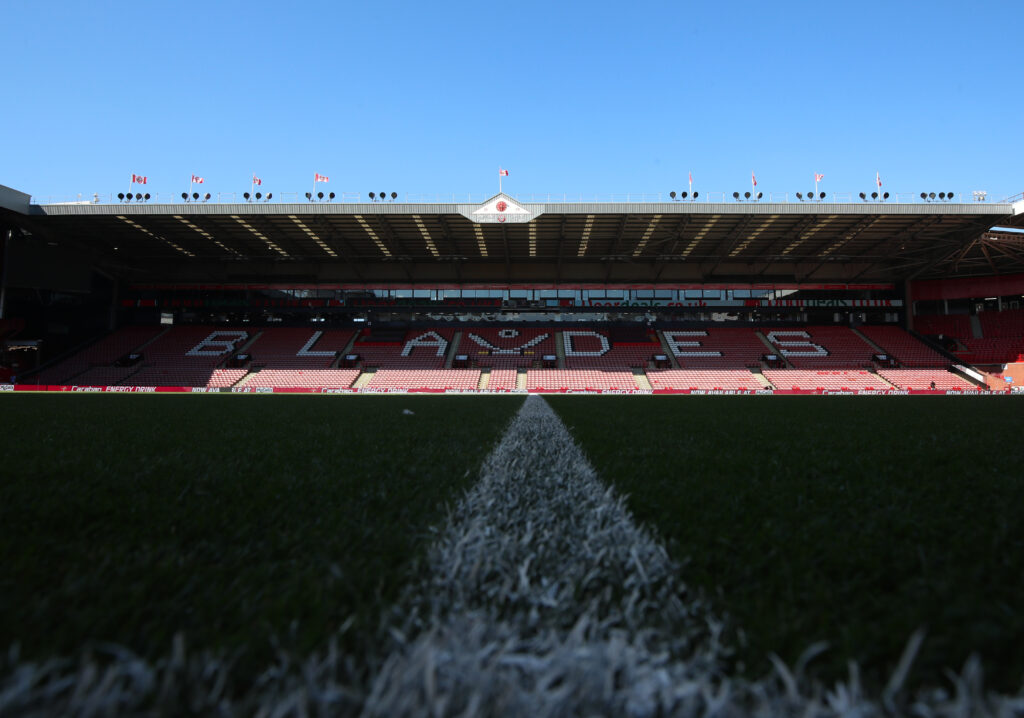
Students will study from classroom suites in Bramall Lane, but will submit assignments to the University of South Wales and travel there twice a year to complete assessments.
The college already run a Football Coaching degree that has about 50 students enrolled, they are hoping this new course will have a cohort of 10 students.
Mr Collins said: “It’s a lot smaller scale than other universities, but it allows us to focus on quality and the level of support for each learner”.
Students can apply through UCAS and the University of South Wales and then will be invited to an interview stage before being offered a place on the course.
For more information about the course please visit the Sheffield United Community Foundation website.

‘We won’t go away’ says anti-abortion group holding 40-day vigil outside hospital
An anti-abortion group holding a 40-day ‘vigil’ outside of the Royal Hallamshire Hospital in Sheffield claim they are there to raise awareness, rather than judge women.
40 Days For Life is an international Christian organisation that claims it is ‘helping to end the injustice of abortion’. Its first campaign took place in 2007, and has reached over 1000 cities in 63 countries.
Rachel Wood, who organises the Sheffield vigils, told Sheffield Wire that the group has been in the area for three years and aims to pray outside the hospital from 8 am to 8 pm, seven days a week, which is when abortions are performed in the hospital.
Mrs Wood, who also assists in running two helplines that aim to end abortion, said: “We believe life is a gift. Abortion hurts women – they think it’s a right to choose, but it does hurt women.”
The group do not consider their actions to be a protest, with Mrs Wood stating that 40 Days For Life considers it a “peaceful prayer vigil.”
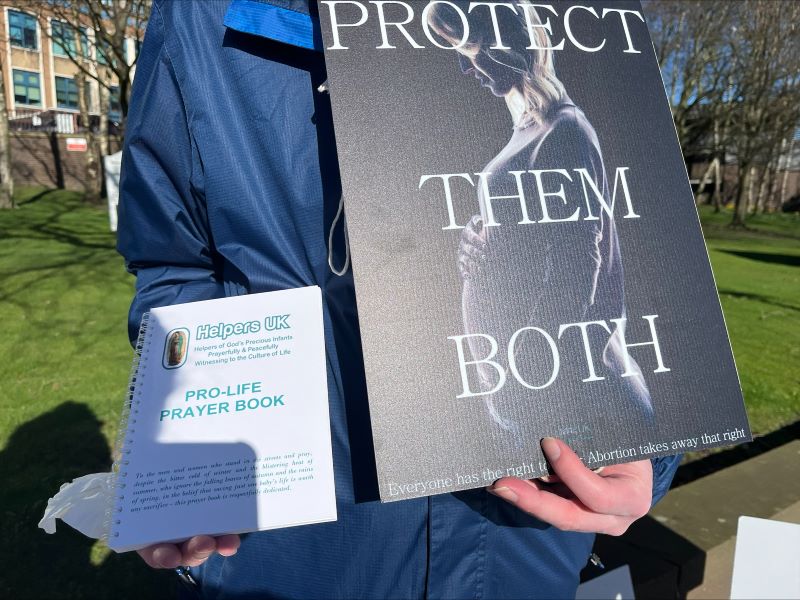
Another one of the vigil attendees, Andrew, declined to provide his last name due to fears surrounding his safety.
He said: “We’ve had vigils interrupted where we’ve just been praying, people have come along and smashed our signs up.
“An elderly gentleman had his sign ripped out of his hands and stood on and torn into small pieces – it was quite shocking, but it wouldn’t deter him from coming.”
Marie, who also declined to provide her surname, said: “People mention rape making it okay to abort, but it’s still a life.
“We speak up for the babies – they have no voice. We won’t go away.”
The group faces heavy criticism in Sheffield. Alexandra, 23, from Sheffield Solidarity Group, said: “We think that being harassed whilst undertaking one of the most difficult decisions a pregnant person can take is an awful thing and should not happen.”
Sarah, who declined to provide her last name, helped to set up the Facebook group ‘Sheffield Protecting the Right to Choose’ in September 2022, after reading about 40 Days For Life. The group aims to establish counter-protests and figure out how to support people in Sheffield.
Sarah believes there should be more buffer zones in place to protect people using the services.
“Everyone’s got a right to their beliefs, but I think there needs to be better securities and systems in place.
“It’s already such a stressful time, adding that stress and judgement on top – I can’t imagine what that feels like.”
Sarah also added that she doesn’t think there are a massive amount of people in Sheffield who aren’t pro-choice.
Vigil attendee Marie disagreed, saying she knows “plenty of people who are pro-life. Maybe they don’t see that.”
According to BPAS, 1 in 3 women will have an abortion by the time they are 45 years old.
Next month, MPs are expected to get a free vote on decriminalising abortion in England and Wales after 24 weeks.

Rishi Sunak condemns MP Lee Anderson’s comments as “wrong”
Rishi Sunak has denied that the Conservative Party has Islamophobic tendencies after comments made by fellow MP Lee Anderson.
Mr Anderson was suspended after failing to apologise for his claims that "Islamists" had "got control" of Sadiq Khan and London.
Mr Sunak said: “Lee’s comments weren’t acceptable, they were wrong. And that’s why he had the whip suspended.
“Words matter, especially in the current environment where tensions are running high and I think it’s incumbent on all of us to choose them carefully.”
Charity says spike in eating disorders is “extremely worrying”
Eating disorder charity, Beat, has seen an increase in people seeking help for ARFID, an avoidant/restrictive food intake disorder.
Andrew Radford, chief executive of Beat, said: “It’s extremely worrying that there has been such a dramatic increase in those seeking support for ARFID, particularly as specialist care isn’t always readily available.
“All too often we hear from people who have been unable to get treatment close to home, or have faced waits of months or even years to get the help they need."
Of the 2,000 calls the charity received last year, 10% of them were from people suffering from ARFID.

Protesters at University of Sheffield demand the immediate removal of a chaplain who served as a soldier in Gaza
After announcements that a chaplain who has served in Gaza would be coming to the University of Sheffield campus this week, a group of students and community activists staged a peaceful protest aimed at preventing him from doing so.
"We refuse to allow Deutsch to step onto campus," wrote the protest organisers in a widely circulated WhatsApp message announcing the action.
Last October, Israeli Rabbi Zecharia Deutsch was called up to serve as part of the reserve unit for the Israeli Defence Forces. In a video clip leaked to the Jewish Chronicle, Rabbi Deutsch said: “What Israel is trying to do is to destroy the evil which is the most moral thing possible. We are also trying to deal with the civilians in Gaza in the best way possible.”
One female student, who did not want to be named, said in a speech at the protest: “Whilst our fellow students find themselves stuck at Rafah, stuck in nylon tents, stuck between life and death, Zecharia Deutsch is able to come and go as he pleases."
Around a hundred activists arrived for a protest on campus with banners at midday on Wednesday, 14 February. Several guards were stationed around the University’s Belief, No Belief, and Religious Life Centre, where the university's chaplains are based.
“How can students watching their homes be bombed from afar think that they would feel safe going to the chaplaincy for support?” said Dr Lisa Stampnitzky, a Lecturer in Politics at the University, during the protest.

"This university has a government mandated duty under the Prevent legislation to prevent students from being drawn into violent religious extremism."
Rabbi Deutsch is primarily a chaplain at the University of Leeds but also serves as an associate chaplain at several Yorkshire universities, including the University of Sheffield. He is not employed by the University of Sheffield, but by the organisation University Jewish Chaplaincy (UJC). After returning to the UK from fighting in Gaza and receiving threats, police advised him, along with his family, to go into hiding.
Previously, protesters sent a letter signed by over 11,000 students, staff, and community members asking the university to stop employing Zecharia Deutsch.
The University of Sheffield responded to a request for comment: "The University of Sheffield’s Belief, No Belief and Religious Life Centre includes a diverse team of chaplains from different faiths and perspectives. For Jewish students, we have a link to the UJC, a local Orthodox Rabbi and a Reform Judaism adviser, and it is important that we maintain an extensive provision for current and future Jewish students."
